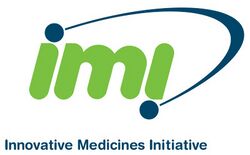Medicine:Innovative Medicines Initiative
| Innovative Medicines Initiative | |
|---|---|
| Joint Technology Initiative on Innovative Medicines | |
 | |
| Keywords | Drug discovery, Drug development |
| Project type | Joint Technology Initiative (JTI) |
| Funding agency | European Commission European Federation of Pharmaceutical Industries and Associations (EFPIA) |
| Framework programme | FP7 |
| Objective | Re-invigorate the European bio-pharmaceutical sector and to make Europe more attractive for private research and development (R&D) investment in this sector |
| Budget |
|
| Duration | 2008 – 2017 |
| Website | www |
The Innovative Medicines Initiative (IMI) is a European initiative to improve the competitive situation of the European Union in the field of pharmaceutical research. The IMI is a joint initiative (public-private partnership) of the DG Research of the European Commission, representing the European Communities, and the European Federation of Pharmaceutical Industries and Associations (EFPIA). IMI is laid out as a Joint Technology Initiative within the Seventh Framework Programme.[1][2][3][4][5][6][7][8] Michel Goldman was the first executive director, from September 2009 until December 2014.[9]
The Innovative Medicines Initiative is aimed towards removing research bottlenecks in the current drug development process. The IMI Joint Technology Initiative (IMI JTI), to be implemented by the IMI Joint Undertaking is meant to address these research bottlenecks. Its €2bn budget makes it the largest biomedical public-private partnership in the world.
The funding scheme has been criticised,[10] requiring universities to invest more money than with EU FP7 programs. Besides the non-competitive financial aspects of participation in IMI projects for academia, this criticism also discusses that intellectual property is freely flowing to industry.
The Sixth Framework Programme's research projects InnoMed AddNeuroMed and InnoMed PredTox acted as pilot projects establishing the feasibility of this particular public-private partnership.[11] Since then, the IMI has had four funding rounds: the first call had the topic Safety, while the second call was about Efficacy. Projects for these two calls are ongoing.[12]
The IMI 2 started in 2014 and will run until 2024, while the IMI 1 is still running. Overall budget is €3.276 billion, taken for half from the European Horizon 2020 program. Goals of that second calls are to improve clinical trials success rate, deliver clinical proof of concept, biomarkers and new medicines.
IMI-Train
In September 2014 IMI-TRAIN, an IMI/ENSO-funded education and training collaboration to support biomedical scientists and professionals, has been launched. IMI-TRAIN will serve as a collaboration platform for the currently IMI-funded education and training projects:[13]
- EMTRAIN: European Medicines Research Training Network
- Eu2P: European programme in Pharmacovigilance and Pharmacoepidemiology
- Pharmatrain: Pharmaceutical Medicine Training Programme
- SafeSciMET: Safety Sciences Modular Education and Training
See also
- International Labour Organization
- World Intellectual Property Organization
References
- ↑ Hughes, V. (2008). "Europe pledges billions to solve its drug development woes". Nature Medicine 14 (2): 107. doi:10.1038/nm0208-107. PMID 18256603.
- ↑ Goldman, M. (2012). "The Innovative Medicines Initiative: A European Response to the Innovation Challenge". Clinical Pharmacology & Therapeutics 91 (3): 418–425. doi:10.1038/clpt.2011.321. PMID 22318619.
- ↑ Frima, H. J.; Gabellieri, C.; Nilsson, M. I. (2012). "Drug delivery research in the European Union's Seventh Framework Programme for Research". Journal of Controlled Release 161 (2): 409–415. doi:10.1016/j.jconrel.2012.01.044. PMID 22333557.
- ↑ Goldman, M. (2011). "Reflections on the Innovative Medicines Initiative". Nature Reviews Drug Discovery 10 (5): 321–322. doi:10.1038/nrd3434. PMID 21532547.
- ↑ Unbiased Biomarkers for the Prediction of Respiratory Disease Outcome (u-Biopred) Consortium; Bel, E. H.; Sousa, A.; Fleming, L.; Bush, A.; Chung, K. F.; Versnel, J.; Wagener, A. H. et al. (2010). "Diagnosis and definition of severe refractory asthma: An international consensus statement from the Innovative Medicines Initiative (IMI)". Thorax 66 (10): 910–917. doi:10.1136/thx.2010.153643. PMID 21106547.
- ↑ Wilkinson, E. (2008). "Will the Innovative Medicines Initiative really deliver innovative medicines?". Molecular Oncology 2 (3): 203–205. doi:10.1016/j.molonc.2008.07.007. PMID 19383340.
- ↑ Kamel, N.; Compton, C.; Middelveld, R.; Higenbottam, T.; Dahlen, S. E. (2008). "The Innovative Medicines Initiative (IMI): A new opportunity for scientific collaboration between academia and industry at the European level". European Respiratory Journal 31 (5): 924–926. doi:10.1183/09031936.00033208. PMID 18448501.
- ↑ Halban, P. A. (2007). "The Innovative Medicines Initiative (IMI): A shot in the arm for European diabetes research?". Diabetologia 50 (9): 1791–1794. doi:10.1007/s00125-007-0740-y. PMID 17611733.
- ↑ "Professor Michel Goldman, Innovative Medicines Initiative". research-europe.com. http://www.research-europe.com/index.php/2013/10/professor-michel-goldman-innovative-medicines-initiative/.
- ↑ Sinha, G. (2011). "Spat over Innovative Medicines Initiative (IMI) funding and intellectual property". Nature Biotechnology 29 (6): 473. doi:10.1038/nbt0611-473a. PMID 21654659.
- ↑ Reference on EFPIA's IMI site
- ↑ Factsheets for IMI projects, IMI, 2011, retrieved 17 August 2011.
- ↑ launch announcement September 2014 (Press Release)
External links
 |

